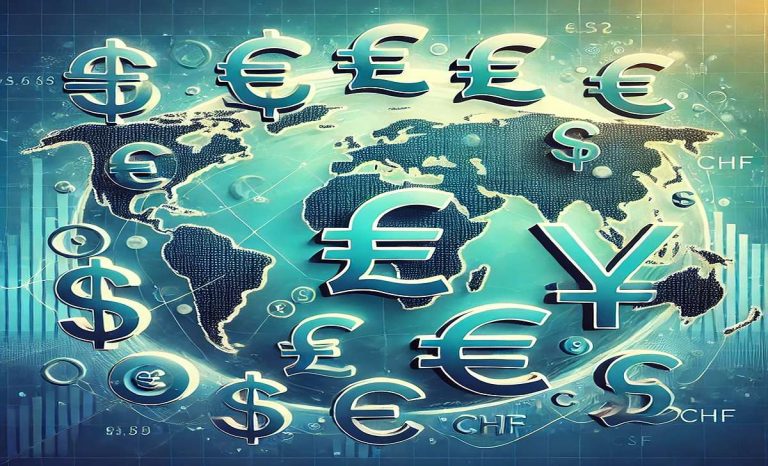Currency exchange rates change constantly, influenced by various economic, political, and market factors. Understanding these factors helps explain why rates fluctuate and can guide you in making better financial decisions, whether you’re traveling, investing, or running a business.
- CONTINUE READING BELOW -
Let’s explore the key factors that affect currency exchange rates in detail:
1. Interest Rates
Interest rates set by a country’s central bank play a crucial role in determining currency value. When interest rates increase, the returns on investments in that country rise, attracting foreign investors seeking higher returns. This boosts demand for the currency, making it stronger. Conversely, lower interest rates make a currency less appealing to investors, leading to depreciation.
Why It Matters:
- Higher interest rates: Attract foreign investments, strengthening the currency.
- Lower interest rates: Reduce investor appeal, weakening the currency.
Example: If the European Central Bank raises interest rates, the Euro may appreciate because more investors would prefer holding Euros to benefit from the higher returns.
2. Inflation Rates
Inflation measures how much prices for goods and services increase over time. A lower inflation rate typically signals a stable economy, supporting a strong currency. In contrast, higher inflation decreases the currency’s purchasing power, making it less attractive to investors and leading to a weaker exchange rate.
Why It Matters:
- Low inflation: Helps maintain currency strength and purchasing power.
- High inflation: Erodes the currency’s value, causing depreciation.
Example: If inflation in the U.K. is lower than in Japan, the British Pound might strengthen against the Japanese Yen because it retains its purchasing power more effectively.
3. Economic Stability and Growth
A country with a stable and growing economy is likely to have a strong currency. Economic indicators like Gross Domestic Product (GDP) growth, employment rates, and manufacturing output all contribute to currency strength. When an economy is expanding, investor confidence increases, driving demand for that country’s currency. Conversely, economic downturns or uncertainty can lead to currency depreciation.
Why It Matters:
- Economic growth: Attracts investors and strengthens the currency.
- Economic instability: Causes uncertainty, weakening the currency.
Example: The U.S. Dollar often appreciates during periods of economic growth in the U.S., as investors seek to benefit from the strong economy.
4. Political Stability and Policies
Political events and government policies significantly influence exchange rates. A politically stable country is more likely to attract foreign investment, supporting a stronger currency. Conversely, political uncertainty or changes in government can lead to fluctuations and weaken the currency. Policies related to taxation, trade, and government spending also play a role in influencing currency value.
Why It Matters:
- Stable political environment: Attracts investments, strengthening the currency.
- Political instability: Increases risk, causing currency volatility.
Example: When the Brexit referendum took place, uncertainty surrounding the U.K.’s future in the European Union led to a sharp decline in the value of the British Pound.
5. Trade Balances
The balance between a country’s exports and imports, known as the trade balance, affects exchange rates. A trade surplus (exports exceed imports) increases demand for the country’s currency because foreign buyers need it to pay for the goods. In contrast, a trade deficit (imports exceed exports) can weaken the currency, as more of the currency flows out of the country to pay for imported goods.
Why It Matters:
- Trade surplus: Strengthens the currency due to higher demand.
- Trade deficit: Weakens the currency due to higher supply.
Example: Countries like Germany, which often have trade surpluses, may see their currency strengthen because of increased demand for their exported goods.
6. Foreign Exchange Reserves
Countries maintain foreign exchange reserves, which consist of assets held in different currencies. These reserves are used to influence exchange rates and stabilize the currency. When a central bank buys or sells its currency in the foreign exchange market, it can affect the currency’s value. High reserves give a country more control over its currency’s strength.
Why It Matters:
- High reserves: Provide the ability to stabilize the currency during economic uncertainty.
- Intervention: Central banks can buy/sell currency to influence the exchange rate.
Example: If a country faces a sudden economic shock, its central bank may sell foreign reserves to buy its own currency, preventing further depreciation.
7. Speculation and Market Sentiment
Currency markets are influenced by traders’ expectations and market sentiment. If traders believe a currency will strengthen due to positive economic news, they may start buying more of that currency, driving its value up. Conversely, if there is fear or anticipation of negative events, traders might sell the currency, causing it to depreciate.
Why It Matters:
- Positive market sentiment: Can boost a currency’s value.
- Negative sentiment: Can lead to rapid depreciation.
Example: If speculators expect the U.S. Federal Reserve to announce an interest rate hike, they may buy U.S. Dollars in anticipation, strengthening the currency even before the official announcement.
8. Global Events and Crises
Major global events, such as natural disasters, wars, or pandemics, can lead to significant changes in currency values. These events can disrupt economies, leading investors to seek safe-haven currencies like the U.S. Dollar, Swiss Franc, or Japanese Yen. This shift in demand can cause weaker currencies to depreciate and safe-haven currencies to appreciate.
Why It Matters:
- Crisis situations: Often strengthen safe-haven currencies.
- Global uncertainty: Leads to currency volatility.
Example: During the 2008 financial crisis, the U.S. Dollar and Japanese Yen gained strength as investors moved their money to safer assets.
Understanding These Factors Can Help You Navigate Currency Fluctuations
Knowing what affects currency exchange rates can help you make smarter financial decisions, whether you’re planning a trip, investing abroad, or managing business finances. While predicting exact movements in exchange rates is challenging, being aware of these key factors will give you a better understanding of why currencies fluctuate and how it may impact your finances.
